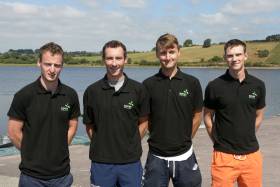Displaying items by tag: Ballantine
Ireland Lightweight Quadruple Take Third in Heat at World Rowing
#Rowing: Ireland finished third in their heat of the lightweight quadruple sculls this morning at the World Rowing Championships in Plovdiv, Bulgaria. Italy took the one direct qualification place for the Final. The men in blue harnessed the good conditions and built a lead through the race. They had a clearwater advantage by the final quarter. In a battle for second place, the Czech Republic pipped the Ireland crew of Fintan McCarthy, Ryan Ballantine, Jake McCarthy and Andrew Goff.
World Rowing Championships, Plovdiv, Bulgaria, Day Two (Irish interest)
Men
Lightweight Quadruple Sculls – Heat Two (First to A Final; rest to Repechage): 1 Italy 5:48.03; 3 Ireland (F McCarthy, R Ballantine, J McCarthy, A Goff) 5:53.43.
New Crew Added to Ireland Team for World Rowing Championships
#Rowing: A lightweight quadruple has been added to the Ireland team for the senior World Championships. Andrew Goff, Ryan Ballantine, Jake McCarthy and Fintan McCarthy will compete alongside the four women’s crews and three men’s crews named earlier this week.
Ireland Team for World Rowing Championships, Plovdiv, Bulgaria, September 9th to 16th:
Men
Pair: M O’Donovan, S O’Driscoll
Lightweight Quadruple: Andrew Goff, Ryan Ballantine, Fintan McCarthy, Jake McCarthy
Double Sculls: Ronan Byrne, Philip Doyle
Lightweight Double Sculls: Gary O’Donovan, Paul O’Donovan
Women
Pair: Aifric Keogh, Emily Hegarty
Double Sculls: Monika Dukarska, Aileen Crowley
Lightweight Double Sculls: Aoife Casey, Denise Walsh
Single Sculls: Sanita Puspure
#Rowing: Ireland’s lightweight quadruple scull of Miles Taylor, Niall Beggan, Ryan Ballantine and Andrew Goff won their repechage and moved into the A Final at the World Under-23 Championships in Poznan, Poland.
The Ireland crew would have gone through with first or second and they disputed the lead with Spain until half way. But Ireland hit that line first and went on to lead. Germany tried hard to push into the top two, but Spain rebuffed them, while Ireland had a one-length lead from Spain at the finish. Britain finished fourth.
Hugh Sutton also came through in his repechage. The 19-year-old raced well to take second and qualify for the quarter-finals of the lightweight single sculls. Four from six qualified. Early on, Egypt’s Omar Amer, who had made a false start, fell to the back of the race and stayed there throughout, while Turkey’s Enes Yenipazarli shot into a lead he would never lose. Sutton stayed in second for most of the race, swapping it with American Zachary Heese, but then beating him in a sprint in the closing stages.
The Ireland men’s and women’s lightweight double sculls had earlier made it directly through their heats.
World Under-23 Championships, Poznan, Poland (Irish interest; selected results)
Men
Lightweight Quadruple Sculls – Repechage (First Two to A Final; rest to B Final): 1 Ireland (M Taylor, N Beggan, R Ballantine, A Goff) 6:01.47, 2 Spain 6:04.02.
Lightweight Double Sculls – Heat Three (First to A/B Semi-Finals; rest to Repechage): 1 Ireland (F McCarthy, J McCarthy) 6:35.94.
Lightweight Single Sculls – Repechage (Top Four to Quarter-Finals; rest to E Final): 2 Ireland (H Sutton) 7:21.51
Women
Lightweight Double Sculls – Heat Four (First Two to A/B Semi-Finals; rest to Repechage): 2 Ireland (L Heaphy, M Cremen) 7:37.99.

























































